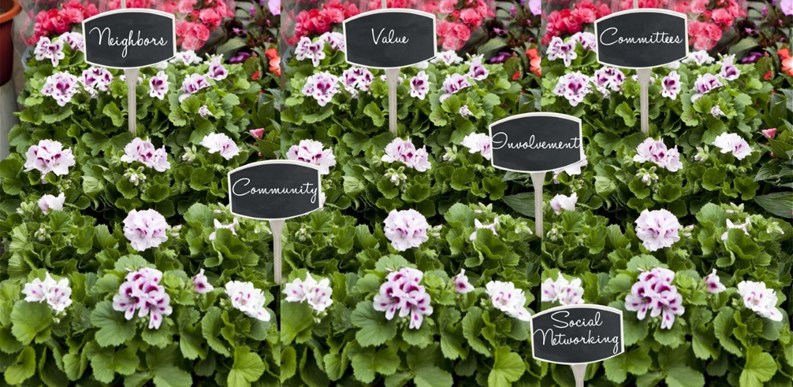The word community, like many words in the English language, has more than one interpretation. A community can be identified as a geographical location--a physical infrastructure of streets, parks and buildings, defined by tangible brick and mortar structures. But a sense of community is often emotional, intangible, and much more difficult to define; it is what makes an address a home, and not just a location.
“Many people enjoy the sense of community where they live,” says Jim Stoller, president of The Building Group in Chicago. “Many people want to know their neighbors and have relationships with people who live in their shared community. They often like to socialize with their neighbors and that’s often part of why they live in a shared community.”
“Building community builds trusts with the board and builds unity,” says Joanne M. Willoughby, PCAM, CMCA, AMS, president & CEO of Associa/Association Services of Florida. “It allows the community to live in harmony.”
Alone Together
Cultivating a sense of community can present a challenge for residents, property managers, and homeowners associations. In a sprawling, heavily populated urban environment like Chicago it is still possible to feel a disconnect from other residents, even those living in the same building, and sharing the same amenities.
“Many people enjoy the sense of community where they live but it’s not for everyone,” says Stoller. “There are people who move into high-rise condominiums or townhomes who don’t want to know their neighbors. They are unfriendly and they close their door and don’t want to have any contact with outsiders. Shared communities have to deal with all types and they cannot require all members to be involved.”
Lives are busy and schedules hectic, and the last thing many people want to do when they’re at home is to go socialize with their neighbors. Building a sense of community is valuable, it creates a network of communication and support among building residents.
“It’s up to the board and managing agent, working together, to instill the feeling of community,” says Marni Berk, general manager and team leader for FirstService Residential, one of the country’s largest property management companies with properties throughout Chicagoland. “The board supplies the focus and the agent is available for the follow-up and follow-through.”
Another drawback of a committee is that it can give its members a false sense of control. “The purpose of a committee is to do investigative work and send their findings to the board of directors to make their decision,” says Willoughby. “So sometimes when you institute committees they think they have more power than they actually do.”
“At Associa, we hold a lot of green events and the residents love them,” says Willoughby. “Lots of people are very conscious of going green these days, so we’ll bring in a company, like Home Depot for example, who will talk about what they offer to communities or individual residents in terms of going green. Our green events are very popular and will gather residents with the same interests.”
“We have many social events in our buildings,” adds Stoller. “Everything from pot-lucks, BBQs, holiday parties to meet and greets within the building. We have groups that get together once a month to have wine and cheese in the social room. There are other buildings where they have card games. We have other buildings that have libraries and residents get together for book clubs. A lot of this is dependent upon the people who live in the community, their age and interest.”
Web-Savvy
Many managers are making use of online communications technology to strengthen communication with their client communities. Berk uses mybuilding.org, an electronic communications system that provides each property with a custom website with all its documents, updates and information, as well as info about the neighborhood—all continuously updated by the property manager and the site's support team.
Residents can login with a private password to receive updates and to communicate with building management, or submit maintenance requests. Berk uses this effective tool to keep residents informed on all levels, both social and maintenance. She tries to proactively anticipate the questions surrounding any posting and have the answers readily available. Answers to questions like “how long will the air conditioning be serviced?” or where is the clothing donation bin now located?” can reassure residents and shareholders, and strengthen a sense of community by effectively saying “we care about you.”
Berk recently sent that message loud and clear when she arranged for a fire safety event for the buildings she manages. She also promotes Project Open, as a resource for senior residents for outings and interaction. She also is aware of the who, what and where of resident-arranged and driven activities like reading groups, card and movie nights, and mahjong games. “Not every building will have space to promote and share these activities, but if a gym or community room is available, residents and management can work out some regularly scheduled events.”
One of the buildings Berk manages has renamed a multi-purpose room, the “play-munity room.” This adaptable space can be divided into two areas to effectively provide for events and socials.
“The Internet has increased communication between boards and residents and unit owners,” says Willoughby. “I just love it.”
Taking it Offline
Anyone looking to grow a sense of community can benefit from looking at the sensitive social interaction Berk and her team members have fostered. In one community, major holidays are recognized and celebrated in every building, all cultures are represented and the children are encouraged to make decorations and help decorate the common areas. Additionally, Berk and FirstService Residential feel board members and property managers should regularly attend social gatherings and holiday parties. “Socials provide an opportunity for interaction with residents and neighbors in an informal setting, Berk explains. There is an opportunity we don’t normally see during regular business hours.”
Everything from yoga classes to crafts and holiday parties can enhance a sense of community and make a property more appealing for residents and management. Many property managers like to see committees involved in selecting activities and classes for community involvement. One board member will typically be in charge of a committee in order to provide seamless communication between the committee and the board.
“Most of our buildings have websites that allow internal communication,” explains Stoller. “So within the websites there are areas that are resident only so that they can set up social events, plan parties and find out information that’s going on within the building. Websites are a great way to communicate internally and both externally about the nature of the community. Even social events can be highlighted in a limited way for people getting information about the community.”
When there is a defined sense of community and ownership residents usually take more interest in the care and maintenance of the property. If there is a loss of the sense of community, it can transfer to a lack of interest and affect the real and perceived value of a property.
Anne Childers is a freelance writer and a frequent contributor to The Chicagoland Cooperator. Staff writer Christy Smith-Sloman contributed to this article.







Leave a Comment